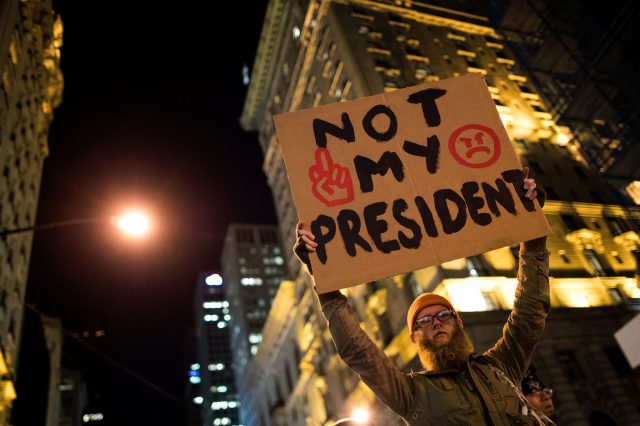Credit: Drew Angerer / Getty

The year 2016 was an annus miserabilis for Left-liberals, causing profound shock and disorientation. In trying to make sense of the vote for Brexit and the election of Donald Trump, various commentators blamed it all on something they called ‘normalisation’. In a nutshell, this is the idea that by granting a platform to fringe voices, the media – and especially the social media – gave the populists mainstream respectability.
Five days after Trump’s victory, the New Yorker ran a piece by Hua Hsu in which he argued that mainstream media attempts to understand the concerns of Trump voters were a kind of normalisation validating “an identity politics that is often rooted in denying other people’s right to the same”.
In his piece for The Atlantic magazine at the end of May 2016, David Frum spoke of the “broken guardrails of democracy” and how the American republic, “long safeguarded by settled norms, was now shattered by the rise of Donald Trump”. This backlash to nationalist populism focuses on one broken guardrail in particular: the loss of traditional gatekeepers to news and information, due to the decline of old media and the advent of social media. The 2016 documentary Hypernormalisation by Adam Curtis took this logic to its ultimate conclusion, by arguing that new media has enabled post-truth politics and the creation of mass false consciousness.
Many advocates of the normalisation narrative also stretch the ideas of Karl Popper to argue that the best way to defeat intolerance is by becoming more intolerant. Only by becoming more (politically) intolerant can (social/cultural) tolerance prevail. Only via authoritarian means can liberal ends prevail.
In recent weeks, we have seen the current shadow education secretary, Angela Rayner, call for social media companies to ban anonymous accounts, the former shadow education secretary Lucy Powell call for closed forums on social media to be eradicated, the deputy leader of the Labour party, Tom Watson, call for a social media regulator, and the President of the EU commission, Jean-Claude Juncker, argue that “press freedom has limits”.
These arguments have found a receptive audience among Left-liberals already inclined towards political intolerance.
The political scientist Rob Ford discovered via his research that 57% of Lab voters would be upset by a Ukip-voting in-law joining the family – putting intolerance of Ukip voters above intolerance of potential in-laws with criminal records (51%.) Noah Carl, a post-doctoral researcher at Oxford University, has listed the various pieces of evidence supporting the contention that people with Left-wing or ‘liberal’ views are more likely to block or unfriend their ideological counterparts on social media than those with Right-wing or conservative views. YouGov have also recently published research demonstrating that Labour and Remain voters are more likely to have politically homogenous friendship groups than Conservative and Leave voters.
Of course, we shouldn’t confuse the response to normalisation with the idea itself – however, that too is deeply flawed. The actual evidence that nationalist populism has metastasised because of the advent of new forms of social media is extremely weak. Multiple studies have shown that the role of digital misinformation is greatly exaggerated. Only 21% of all American adults are on Twitter and only 15% of Republicans follow Donald Trump, for instance. In the UK, only 17% of the population use Twitter. Studies have found that political polarisation is more acute among low-level internet users, and that social media can reduce polarisation rather than exacerbating it.
The normalisation narrative therefore grants an illusory sense of control; ie, the false hope that the liberal Left can defeat populism by doing something about social media. As the Financial Times journalist John Burn-Murdoch Tweeted in January:
7/6 Suspect we obsess over social media filter bubbles and not socio-geographic bubbles of physical world coz it's comforting — but wrong — to think FB & Twitter can fix society, when actually it's about us spending face-time w/ people who have different worldviews (god forbid)
— John Burn-Murdoch (@jburnmurdoch) January 17, 2018
The normalisation narrative reinforces the political intolerance of the Left, closing off the constructive criticism and reality-testing required to adapt to new political terrain. It should worry Left-liberals that evidence points towards the fact that Leave voters characterise Remain voters more accurately than Remain voters characterise Leave voters.
By encouraging suspicion of alternative viewpoints, the normalisation narrative makes it harder for Left-liberals to think their way through the current crisis, which they believe is characterised by a turn against the ongoing march of liberal progress. If you believe in the pre-Darwinian idea that history has a telos and that it is one of liberal progress – “the arc of history is long but it bends towards justice” – the only logical conclusion to draw when people vote the wrong way is that they were receiving the wrong information (and that, therefore, the information providers somehow must be to blame).
The evidence suggests otherwise, but Left-liberals cannot hear it from their own padded echo chambers. Instead, they receive distorted information about the world around them from social media sites such as Twitter, because they disproportionately dominate it. This leaves them at a disadvantage in terms of receiving accurate information as to what the rest of the population actually thinks.
Rather than seeking to regulate cyberspace, they might find it more profitable to speak to people in the real world with whom they have political differences. We live in a country in which 25% of all graduate jobs are to be found in one city and so Left-liberals – predominantly university-educated and metropolitan – might want to think twice before they cut themselves off even further from their compatriots.










Join the discussion
Join like minded readers that support our journalism by becoming a paid subscriber
To join the discussion in the comments, become a paid subscriber.
Join like minded readers that support our journalism, read unlimited articles and enjoy other subscriber-only benefits.
Subscribe